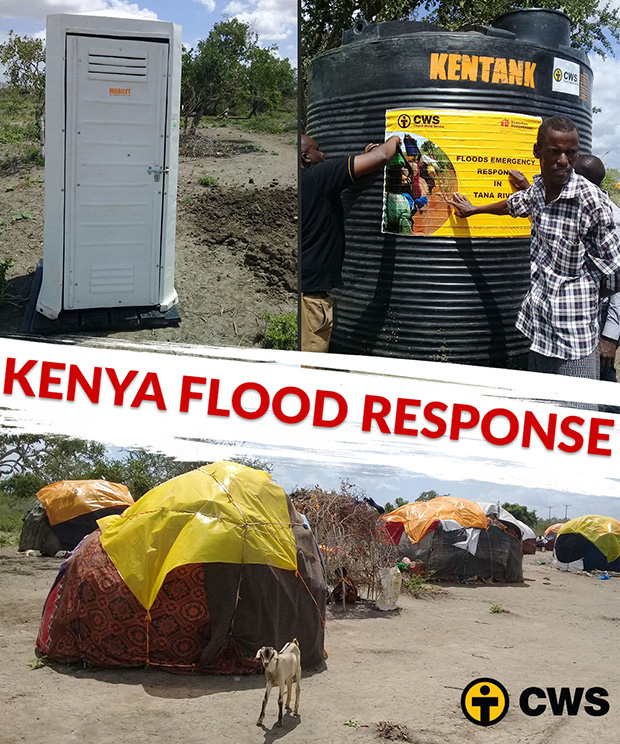June 4 Update:
Our team has installed 10,000-liter (2,642-gallon) water tanks in six of the seven camps that we identified, and we have made arrangements with the Kenya Red Cross to have the tanks filled with clean water. Portable latrines have been installed in each camp. Hygiene and sanitation education sessions have been conducted and will continue this week. We have purchased food from a nearby town and are working with community leaders to determine who is most in need of these supplies. Distributions of food and supplies will begin soon.
—–
Situation
Severe flooding in Kenya has displaced more than 311,000 people, killing 132 and injuring 23, according to the National Disaster Management Agency. More than 6,000 livestock have been killed, and flood waters have submerged more than 9,500 acres of farmland. Infrastructure including houses, health centers, schools and roads have been damaged or destroyed.
About half of displaced people live in Tana River County, where 117 villages have been affected. Furthermore, the Masinga Dam is at risk of bursting soon, which would mean further flooding.
CWS staff conducted a rapid assessment in seven camps for displaced people in Tana Delta Sub County, where floods have destroyed about $860,000 worth of crops. The normal planting season here runs from mid-April through mid-June, which means that the flooding has come as a particularly devastating time. The price of food items has dramatically increased in recent weeks – the price of tomatoes, for example, is now nearly seven times what it was three weeks ago. More than half of people displaced by flooding are living on a single meal each day, which is provided by the government as food assistance.
Most camps for displaced people do not have access to clean water. The Daily Nation reports that, “About 700 flood victims living in camps in Tana River County have been hit by an outbreak of acute diarrhea, skin and respiratory infections…Kenya Red Cross Coast regional manager Hassan Musa said that children are most affected.” Camp residents are spending considerable time daily accessing distant water sources. Open defecation in the camps is common; latrine construction is an urgent need. The CWS rapid assessment found that nearly three quarters of families reported sickness, most of which stemmed from poor hygiene and sanitation.
Most of the displaced people our team talked to reported that wild animals, especially hyenas, attack camps at night.
CWS Response
Over the coming year, CWS will lead the ACT Alliance response to the flooding in Tana River County. This response will focus on serving 910 households, or nearly 7,300 people, as they rebuild their homes and livelihoods and return from the camps.
Flood damage has affected many facets of daily life for these families, so the CWS response will be correspondingly comprehensive. Over the next month, our team will distribute mosquito nets, cooking supplies, sleeping mats, plastic plates and cups, blankets and laundry basins to each household as well as hygiene supplies like soap to each individual and baby supplies where needed. We will help reconstruct 910 houses by providing iron sheets, nails and timber and hiring skilled construction teams. Our team and partners will also focus on supporting families as they produce fast-growing, nutritious vegetables that will be ready to eat within a month. We will work with women from each of the 910 households in 30 groups to provide seeds and conduct training on household vegetable gardens. Additionally, 75 livestock keepers will receive training on hay harvesting and support to build communal hay bins, since this vegetation cover will be heavy and unusable after the flood.
The CWS response will also focus on impacted community institutions. We will support the school management boards of 10 schools as they rebuild, including providing materials to renovate existing or build new infrastructure, including classrooms, staff rooms, bathrooms, water tanks and fences. We will also provide supplies like desks, chairs and books. Our team will work with 300 community members in 10 groups to kickstart business rebuilding through marketing training and establishing and strengthening Village Savings and Loans Associations. By providing seed grants and training to VSLAs, we will help build self-reliance and resilience in the face of future emergencies.
CWS and partners will help support community members by training leaders in trauma healing. Trauma healing will also be part of our work with school communities.
Additionally, as noted above, a lack of safe water and sanitation facilities in camps for displaced people remains a significant challenge. Our team will work with four camps that are far from water access and have no sanitation facilities. We will provide mobile water tanks, water purification systems and mobile toilets. In partnership with the Kenyan government, we will work to ensure that the 490 households living in these camps have sufficient water access for three months. Personal hygiene and sanitation education will also be integrated into all program activities, particularly for vulnerable groups.
Budget
Program activities: $797,802
- Supplies for households and individuals: $249,102
- Trauma healing and conflict management training: $6,200
- Early recovery, livelihood restoration and house reconstruction: $527,500
- Rebuilding businesses: $15,000
Other program costs: $208,360
Includes staff, implementation, logistics, assets and equipment and other program costs
Indirect costs: $61,232
TOTAL BUDGET: $1,067,394
How to Help
Contributions to support CWS flood response efforts may be sent to your denomination or to Church World Service, P.O. Box 968, Elkhart, IN 46515. Please designate 642U – Kenya Flood Response. Donations may also be made online at www.cwsglobal.org/kenya-floods.
CWS is a member of the ACT Alliance, a global coalition of churches and agencies engaged in development, humanitarian assistance and advocacy.

